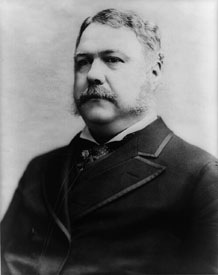Part 21 of My Presidential Review Series

After a long delay, here is Chester A. Arthur. Arthur was one of only four presidents to never even be nominated in his own right. As a conservative Stalwart, Arthur had served as a compromise for accepting the reform-minded Garfield as the presidential-nominee. A product of patronage, he was forced out of the position of Collector of the Port of New York by Rutherford B. Hayes. Arthur's sudden conversion to reform lost him the support of the Stalwarts while failing to win over the reformer Independents, thus denying him renomination in favor of James G. Blaine. Arthur served September 20, 1881 to March 4, 1885.
Bypassing the spirit if not the actual word of the Treaty of 1880, which allowed restriction and temporary suspension but not an outright ban on Chinese immigration, Congress passed a bill suspending Chinese immigration for 20 years. Arthur vetoed this one but signed the Chinese Exclusion Act, which shortened it to 10 years. The bill also forbade the courts from awarding citizenship to Chinese immigrants already in America. The law was renewed in 1892 and 1902, and repealed in 1943.
Arthur vetoed the River and Harbors Act of 1882, which appropriated $19 million for various internal improvements, deeming it pork barrel legislation. Congress overrode his veto, but Arthur was commended for vetoing what was widely considered an unwarranted Treasury raid.
In 1883, the Pendleton Act was passed, which started the modern civil service system. For more than a decade, there had been calls for an end to patronage, but not until a President was shot down by a disappointed office seeker did Congress take action. Arthur, a practitioner and product of patronage, enraged his supporters and delighted his critics in signing the act and enforcing it. Sponsored by Democratic Senator George H. Pendleton of Ohio, it created a bipartisan three-man Civil-Service Commission to oversee the system. Arthur showed his determination for this to work by appointing men long committed to civil service reform, especially the chairman Dorman B. Eaton, a leader of the reform movement in New York and author of the Pendleton Act. The law created open, competitive exams for applicants for government jobs classified under civil service, banned exacting political contributions from civil servants or otherwise pressing them into partisan service, excluded alcoholics from civil service, and curbed nepotism.
Arthur created a tariff commission in 1882, which recommended that duties be cut. Protectionists and free-traders attacked Capitol Hill, each lobbying members setting about the task of tariff reform. Buffeted from every side, Congress created and approved a patchwork bill, called the Mongrel Tariff, which overall reduced duties by less than 1.5 percent. Arthur signed it, but no one was satisfied. The Mongrel Tariff marked the beginning of the tariff struggle along distinct party lines, Republicans becoming protectionists and Democrats champions of free trade.
Chester A. Arthur died on November 18, 1886.
Arthur was, like so many VPs become presidents, remarkably average. Little occurred in his term, and even less was actually accomplished by him. However, by signing and enforcing the Pendleton Act, he continued the work of James A. Garfield in destroying patronage. It was not yet completely destroyed, but the act made significant strides towards this goal. But Arthur is, sadly, just the Stalwart VP who became the Independent President.
Overall Ranking: 26
"Men may die, but the fabrics of our free institutions remain unshaken. No higher or more assuring proof could exist of the strength and permanence of popular government than the fact that though the chosen of the people be struck down his constitutional successor is peacefully installed without shock or strain except the sorrow which mourns the bereavement."